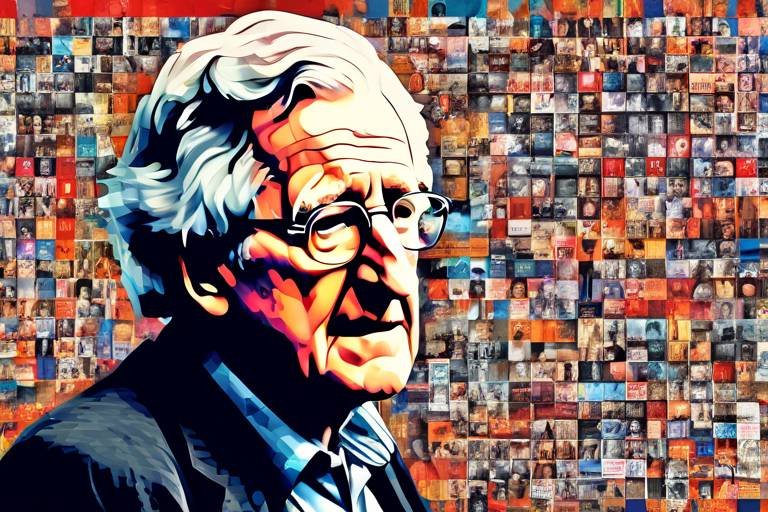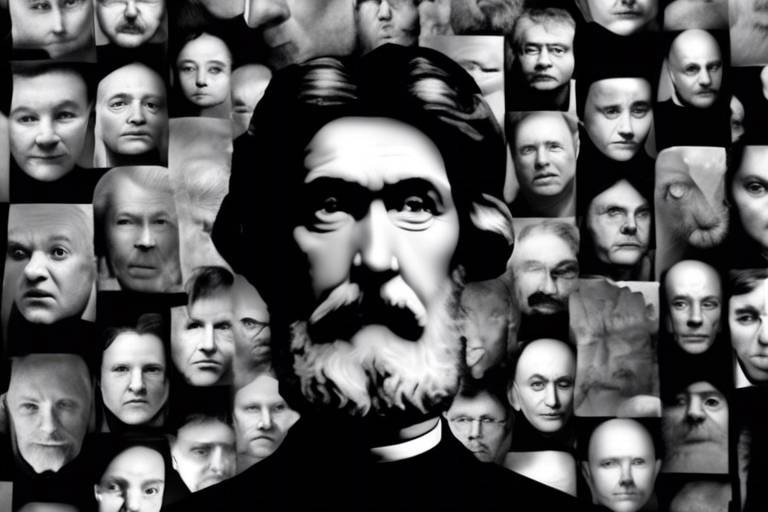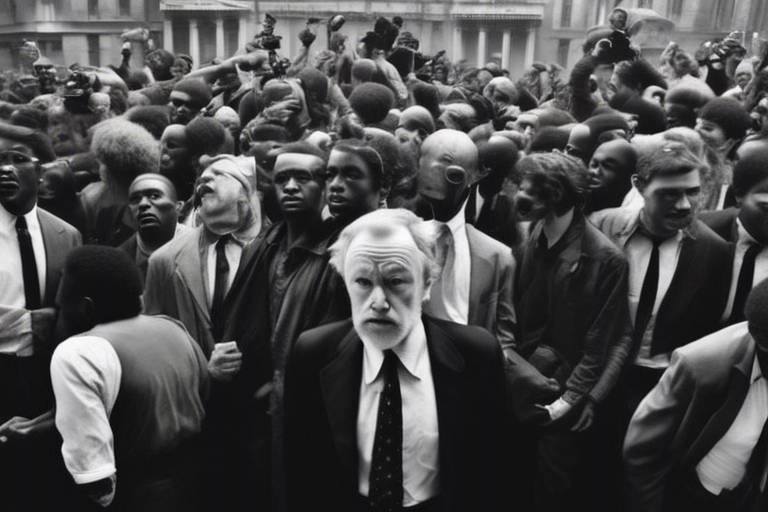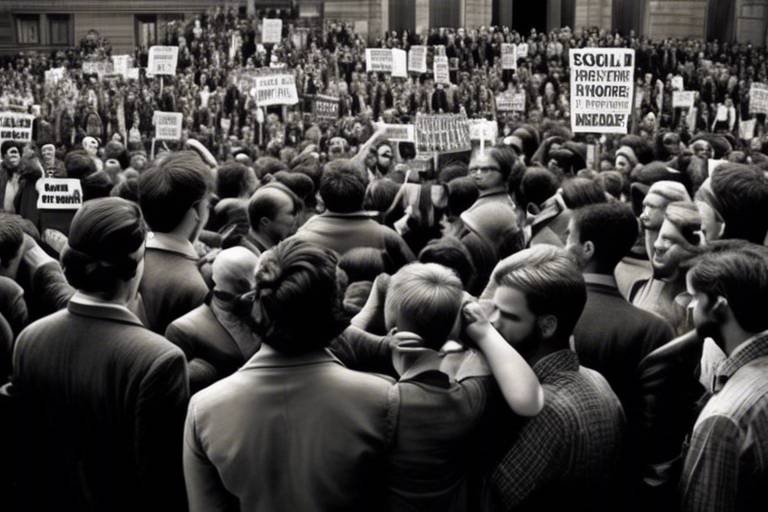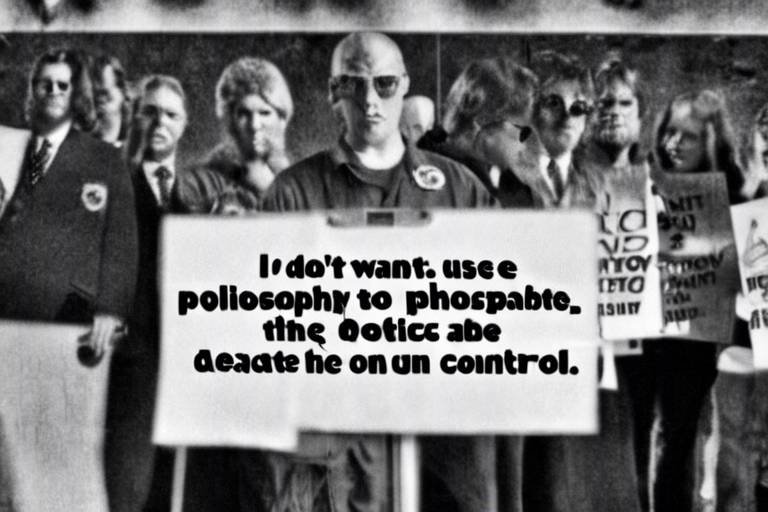Assessing Noam Chomsky’s Political Philosophy
Noam Chomsky, a name that resonates across the realms of linguistics, philosophy, and politics, is not just an intellectual titan but also a beacon for those who seek to understand the intricate web of power dynamics in our society. His political philosophy is a rich tapestry woven from strands of critique, advocacy, and a relentless pursuit of justice. Chomsky’s work challenges us to peel back the layers of authority and question the status quo, urging us to recognize the often invisible forces that shape our lives. Through his incisive critiques, he invites us to engage critically with the world around us, making his ideas not only relevant but essential in today's complex socio-political landscape.
At the heart of Chomsky's political thought is a profound skepticism towards concentrated power. He argues that when power is centralized in the hands of a few, it poses a significant threat to democracy and individual freedoms. This perspective is particularly crucial in an era where many feel disillusioned with political institutions. Chomsky encourages us to question authority—be it governmental, corporate, or media-driven—and to recognize the potential of grassroots movements. These movements, he argues, are essential for fostering genuine political change. They empower individuals, giving them a voice in a system that often seeks to silence dissent. In Chomsky's view, true democracy is not merely about casting votes; it’s about active participation and advocacy.
Chomsky's analysis of media is nothing short of revolutionary. He posits that mainstream media often operates as a tool for propaganda, serving the interests of a powerful elite rather than the public. This notion raises critical questions: How can we trust what we see and hear in the news? Are we being presented with a fair and balanced view of events? According to Chomsky, the media shapes public perception and limits critical discourse, which is vital for a functioning democracy. By controlling the narrative, those in power can manipulate public opinion, creating a populace that is more compliant and less likely to question the status quo. This is where Chomsky’s call for media literacy becomes paramount; he urges us to become discerning consumers of information.
In his seminal work, "Manufacturing Consent," Chomsky delves into the mechanisms through which public opinion is shaped and controlled. He illustrates how consent is not something that is freely given but rather manufactured through a complex interplay of media and political structures. This concept challenges our understanding of democratic legitimacy and raises profound questions about the nature of freedom in a society where public opinion is so easily swayed. Chomsky's insights compel us to reflect on our own beliefs: Are we truly informed citizens, or are we merely products of a system designed to keep us compliant? This critical examination of consent forces us to confront uncomfortable truths about our own complicity in the structures of power.
Chomsky is a vocal critic of U.S. foreign policy, particularly its imperialistic tendencies. He argues that military interventions often serve corporate interests rather than genuine humanitarian needs. This perspective invites a reevaluation of ethical considerations in international relations. For instance, when we consider military actions in various countries, we must ask ourselves: Who benefits from these interventions? Are we truly acting in the best interest of the people, or are we perpetuating a cycle of violence and exploitation? Chomsky's critiques urge us to think critically about the narratives surrounding war and to consider the broader implications of our government's actions on a global scale.
Chomsky's philosophy is deeply rooted in the pursuit of social justice. He emphasizes the need for activism to address systemic inequalities that permeate our societies. His work serves as a rallying cry for individuals to engage in political activism as a means to challenge oppressive systems and promote equity. Chomsky believes that change is not just possible; it is necessary. He inspires us to take action, to stand up against injustices, and to advocate for a more just world. This call to action is not merely theoretical; it is a practical guide for those who wish to effect real change in their communities.
Education, in Chomsky's view, is the cornerstone of a healthy democracy. He stresses the importance of fostering critical thinking skills among individuals. An informed populace is essential for resisting manipulation by those in power. Chomsky advocates for educational reform that promotes independent thought and encourages students to question the information presented to them. This approach transforms education from a mere transmission of knowledge into a powerful tool for social change. By nurturing critical thinkers, we empower future generations to challenge the status quo and advocate for justice.
Noam Chomsky's ideas have profoundly shaped contemporary political thought. His critiques resonate with activists, scholars, and policymakers alike, encouraging a reevaluation of traditional political ideologies. Chomsky's work inspires new approaches to understanding power dynamics, urging us to consider the complexities of authority and resistance. His influence extends beyond academia; it permeates social movements and grassroots organizations, fueling a collective desire for change. As we navigate the challenges of the modern world, Chomsky's insights remain a guiding light for those committed to justice and equity.
While Chomsky's theories have garnered widespread acclaim, they are not without their detractors. Some argue that his views can be overly cynical or dismissive of potential reforms within existing systems. This critique prompts ongoing debate about the validity of his perspectives. Are Chomsky's critiques constructive, or do they risk fostering a sense of hopelessness? Engaging with these challenges is essential for a holistic understanding of his philosophy and its implications for contemporary political discourse.
Noam Chomsky's political philosophy continues to resonate, encouraging critical engagement with societal issues. His legacy serves as a reminder of the importance of questioning authority and advocating for a more just and equitable world. As we reflect on his contributions, we are called to action, inspired by his unwavering commitment to justice. Chomsky's work is not just a collection of theories; it is a call to arms for those who believe in the power of informed citizens to effect change. In a world rife with challenges, Chomsky's insights remind us that the pursuit of justice is a continuous journey, one that requires our active participation.
- What is Noam Chomsky known for?
Noam Chomsky is known for his contributions to linguistics, philosophy, and political activism, particularly his critiques of power structures and media influence. - How does Chomsky view the media?
Chomsky views mainstream media as a tool for propaganda that often serves elite interests rather than the public good. - What is "Manufacturing Consent"?
"Manufacturing Consent" is a book by Chomsky that explores how public opinion is shaped and controlled through media and political structures. - Why is Chomsky critical of U.S. foreign policy?
Chomsky criticizes U.S. foreign policy for its imperialistic tendencies, arguing that military interventions often serve corporate rather than humanitarian interests. - What role does education play in Chomsky's philosophy?
Chomsky emphasizes the importance of education in fostering critical thinking, which he believes is essential for resisting manipulation by those in power.

Chomsky's Critique of Power
Noam Chomsky’s critique of power is a profound examination of the structures that govern society and the inherent dangers they pose to democracy and individual freedoms. He argues that when power becomes concentrated in the hands of a few, it not only undermines the core principles of democracy but also stifles the voices of the marginalized. Chomsky challenges us to look beyond the surface of political systems and question the authority that often goes unexamined. This is not just an academic exercise; it’s a call to action for ordinary citizens to engage in grassroots movements that can lead to genuine political change. By emphasizing the importance of collective action, Chomsky inspires individuals to reclaim their agency in a world where powerful elites often dictate the terms of engagement.
Chomsky’s insights compel us to reflect on the nature of authority and the mechanisms through which it operates. He posits that power is not merely a static entity but a dynamic force that requires constant scrutiny. The question then arises: how do we empower ourselves and others to challenge these structures? Chomsky suggests that awareness and education are essential tools in this struggle. By fostering critical thinking and encouraging open dialogue, we can dismantle the narratives that serve to uphold oppressive systems.
Moreover, Chomsky’s critique extends to the role of institutions that perpetuate power imbalances. He highlights how political and economic systems often prioritize profit over people, leading to a cycle of exploitation. This is where grassroots activism becomes crucial. It’s not enough to merely recognize the issues; we must actively participate in movements that advocate for change. Chomsky’s work serves as a reminder that democracy is not a given; it is something that must be fought for and defended.
In a world where misinformation and propaganda are rampant, Chomsky’s philosophy encourages us to be vigilant. He urges us to question the sources of information we consume and to seek out diverse perspectives. By doing so, we can better understand the complexities of power and its impact on our lives. Ultimately, Chomsky’s critique of power is a rallying cry for those who believe in the potential for a more equitable society, one where the voices of the many can challenge the dominance of the few.
- What is Noam Chomsky’s main argument regarding power?
Chomsky argues that concentrated power undermines democracy and individual freedoms, and he advocates for grassroots movements to challenge these structures.
- How does Chomsky view the role of education in society?
He believes that education is crucial for fostering critical thinking skills, which are necessary for resisting manipulation by those in power.
- What actions does Chomsky suggest to combat power imbalances?
Chomsky encourages individuals to engage in grassroots activism and to question authority by seeking diverse perspectives and promoting dialogue.

The Role of Media in Society
The media plays a crucial role in shaping our understanding of the world around us. Noam Chomsky, a renowned linguist and political activist, emphasizes that media is not merely a conduit for information but a powerful tool that can be wielded to influence public perception. In his analysis, Chomsky argues that mainstream media often serves the interests of the elite, creating a narrative that aligns with corporate and governmental agendas. This manipulation of information can lead to a distorted view of reality, where critical discourse is stifled and dissenting voices are marginalized.
One of Chomsky's significant contributions to media theory is his concept of "manufacturing consent." He posits that the media does not just report news; it actively shapes it. By selectively highlighting certain stories while downplaying others, the media can create a version of reality that serves the powerful. This raises an important question: How can we, as consumers of media, discern the truth? Chomsky encourages us to become critical thinkers, questioning the narratives presented to us and seeking out diverse perspectives.
To illustrate this point, consider the following table that outlines the differences between independent media and mainstream media:
| Aspect | Mainstream Media | Independent Media |
|---|---|---|
| Ownership | Often owned by large corporations | Frequently operated by individuals or small groups |
| Content Focus | Prioritizes profit and viewer ratings | Focuses on niche topics and underreported issues |
| Funding | Advertiser-driven revenue | Donations, subscriptions, or crowdfunding |
| Accountability | Less transparent, often influenced by advertisers | More accountable to the audience and community |
This table highlights the stark contrasts between mainstream and independent media, reinforcing Chomsky's argument that the latter often provides a more honest and nuanced portrayal of events. As consumers, we must navigate this landscape carefully, recognizing the biases inherent in the media we consume. Chomsky's work serves as a reminder that an informed populace is essential for a healthy democracy. By engaging critically with media, we can empower ourselves to challenge the status quo and advocate for a more just society.
In conclusion, Chomsky's insights into the role of media in society are not just academic; they are a call to action. We must remain vigilant and proactive in our consumption of media, ensuring that we seek out diverse viewpoints and question the narratives presented to us. Only then can we truly understand the complexities of the world and contribute to a more informed and equitable society.
- What is the primary argument of Chomsky regarding media? Chomsky argues that mainstream media often serves elite interests, manipulating public perception and limiting critical discourse.
- What does "manufacturing consent" mean? It refers to the process by which media shapes public opinion, often aligning with corporate and governmental agendas rather than presenting unbiased information.
- How can I become a more critical media consumer? Engage with diverse media sources, question the narratives presented, and seek out independent media to gain a broader perspective.

Manufacturing Consent
Noam Chomsky's concept of "Manufacturing Consent" is a profound exploration of how public opinion is shaped and manipulated through the interplay of media and political structures. In his seminal work, co-authored with Edward S. Herman, Chomsky argues that the media does not merely report the news but plays a pivotal role in creating a narrative that serves the interests of the elites. This notion challenges the widely held belief that media operates as an independent watchdog, instead revealing its function as a tool for propaganda. The implications of this theory are staggering, as they compel us to reconsider the very nature of democracy and the legitimacy of our consent.
Chomsky outlines a framework for understanding how consent is manufactured rather than freely given. He identifies several key mechanisms through which this occurs:
- Media Ownership: A handful of corporations control a significant portion of the media landscape, leading to a homogenization of viewpoints and a narrow representation of issues.
- Advertising Revenue: The need for media outlets to secure advertising revenue often results in a bias towards content that pleases advertisers, sidelining critical or controversial topics.
- Framing of Issues: The way news is presented can skew public perception, influencing how we understand complex social and political issues.
These mechanisms create an environment where dissenting voices are marginalized, and alternative perspectives are often excluded from mainstream discourse. Chomsky’s analysis highlights the importance of media literacy, urging individuals to critically evaluate the information they consume. By recognizing the underlying motives of media narratives, we can begin to reclaim our agency in the political landscape.
Moreover, Chomsky's work raises essential questions about the nature of democracy itself. If public opinion is manufactured, to what extent can we claim to live in a truly democratic society? This inquiry becomes even more pressing in an age dominated by social media, where algorithms curate our newsfeeds and further entrench existing biases. The challenge lies in fostering a culture of critical thinking and independent inquiry, empowering individuals to seek out diverse sources of information and engage in meaningful discourse.
Ultimately, "Manufacturing Consent" serves as a clarion call for awareness and activism. Chomsky encourages us to challenge the narratives presented by mainstream media and to seek out the truth behind the headlines. By doing so, we can cultivate a more informed citizenry capable of holding power accountable and advocating for genuine change.
- What is the main idea behind "Manufacturing Consent"? The book argues that media serves elite interests and manipulates public opinion rather than providing unbiased news.
- How does media ownership affect the news we consume? A few corporations control most media outlets, leading to a lack of diverse viewpoints and a narrow focus on issues.
- Why is media literacy important? Understanding how media operates helps individuals critically assess information and resist manipulation.

Chomsky on War and Imperialism
Noam Chomsky has long been a fierce critic of U.S. foreign policy, particularly when it comes to the issues of war and imperialism. His arguments illuminate a troubling reality: that military interventions often prioritize corporate interests over humanitarian needs. This perspective invites us to reconsider the motivations behind military actions and the narratives that surround them. Chomsky asserts that these interventions are frequently cloaked in the guise of altruism, yet they often serve to expand the influence of powerful entities rather than genuinely assist those in need.
Chomsky's analysis reveals a pattern where the U.S. government engages in military actions under the pretext of promoting democracy and stability. However, he argues that the underlying motives are often more self-serving. For instance, the invasion of Iraq in 2003 is frequently cited as a prime example of this imperialistic behavior. Chomsky contends that the justification for war was rooted in a desire to control resources and maintain geopolitical dominance rather than to liberate the Iraqi people.
Moreover, Chomsky emphasizes the role of the media in shaping public perception of these conflicts. He argues that mainstream media often frames military interventions in a way that aligns with government narratives, effectively acting as a propaganda tool. This manipulation of information not only skews public understanding but also limits critical discourse about the ethical implications of such actions. In this context, Chomsky challenges us to remain vigilant and question the narratives presented to us, urging a deeper inquiry into the consequences of war.
In examining the broader implications of Chomsky's views on war and imperialism, we can identify several key points:
- Corporate Interests: Chomsky argues that military interventions often serve to protect and advance the interests of corporations, particularly in the defense and energy sectors.
- Humanitarian Rhetoric: The language used to justify wars frequently employs humanitarian ideals, masking the true motivations behind military actions.
- Media Manipulation: The mainstream media plays a critical role in shaping public opinion, often reinforcing government narratives and stifling dissenting voices.
Chomsky's critique of war and imperialism is not merely academic; it serves as a clarion call for individuals to engage in critical thinking and activism. He encourages us to challenge the status quo and advocate for a foreign policy that genuinely prioritizes human rights and global equity. By fostering a more informed and engaged citizenry, Chomsky believes we can begin to dismantle the systems of power that perpetuate conflict and inequality.
| Question | Answer |
|---|---|
| What is Chomsky's main argument regarding U.S. foreign policy? | Chomsky argues that U.S. military interventions often serve corporate interests rather than humanitarian needs. |
| How does Chomsky view the role of media in conflicts? | He believes that mainstream media acts as a propaganda tool that shapes public perception to align with government narratives. |
| What does Chomsky suggest individuals do in response to his critiques? | He encourages critical thinking and activism to challenge the status quo and advocate for more equitable foreign policies. |

Social Justice and Activism
Noam Chomsky’s philosophy is deeply rooted in the pursuit of social justice, which he passionately advocates for throughout his work. His perspective is not merely academic; instead, it serves as a rallying cry for individuals to engage in activism aimed at addressing systemic inequalities. Chomsky argues that true change cannot occur without the active participation of the populace, emphasizing that it is the responsibility of each individual to challenge the status quo. This notion resonates with many, as it ignites a sense of purpose and urgency in the fight against oppression.
Chomsky believes that activism is essential for fostering a society where equity prevails. He encourages people to take a stand against injustices, whether they are social, economic, or political. To illustrate this, he often points to historical movements that have successfully challenged oppressive systems. These movements, fueled by grassroots efforts, demonstrate the power of collective action. Chomsky’s insights challenge individuals to recognize their potential impact and to understand that every voice matters in the quest for a more just society.
Moreover, Chomsky underscores the importance of solidarity among activists. He argues that by uniting various movements—such as those advocating for racial equality, gender rights, and economic justice—a more formidable front can be established against the entrenched powers that perpetuate inequality. He asserts that these struggles are interconnected, and thus, a comprehensive approach is necessary to achieve lasting change.
Chomsky also highlights the role of education in activism. He believes that an informed populace is crucial for fostering a culture of resistance. By promoting critical thinking and awareness of social issues, education empowers individuals to question the narratives presented by those in power. Chomsky's advocacy for educational reform aims to cultivate a generation that is not only aware of the injustices around them but is also equipped to challenge them.
In summary, Chomsky's philosophy on social justice and activism serves as a powerful reminder that change is possible when individuals come together to fight for their rights and the rights of others. His work inspires a commitment to activism that transcends mere awareness, urging people to take action and contribute to the ongoing struggle for a more equitable world. As he often states, the path to justice is paved with the efforts of those who refuse to remain silent in the face of oppression.
- What is Noam Chomsky's stance on social justice?
Chomsky advocates for social justice by emphasizing the need for activism to address systemic inequalities and encouraging individuals to challenge oppressive systems. - How does Chomsky view the role of education in activism?
He believes education is vital for fostering critical thinking skills, enabling individuals to resist manipulation and engage effectively in social justice movements. - What does Chomsky mean by solidarity in activism?
Chomsky emphasizes that various social movements should unite to create a stronger front against inequality, as these struggles are interconnected.

Education and Critical Thinking
Noam Chomsky places a profound emphasis on the role of education in cultivating critical thinking skills among individuals. He argues that education should not merely be a means to acquire knowledge but should also empower students to question the status quo and think independently. In a world inundated with information, the ability to critically assess sources and arguments is more important than ever. Chomsky believes that an informed populace is crucial for resisting manipulation by those in power. He asserts that when individuals are educated to think critically, they become less susceptible to propaganda and more capable of making informed decisions about their lives and the society they inhabit.
Chomsky’s vision for education extends beyond traditional classroom settings. He advocates for a more holistic approach to learning that encourages students to engage with real-world issues. This means fostering environments where students can discuss, debate, and analyze various perspectives on political, social, and economic matters. Such an approach not only enriches their understanding but also equips them with the tools to challenge oppressive systems. In this context, education becomes a form of activism, as it empowers individuals to advocate for change.
Moreover, Chomsky critiques the current education system, which often prioritizes rote memorization over critical engagement. He argues that this model stifles creativity and discourages students from questioning authority. Instead, he proposes a curriculum that emphasizes critical inquiry and encourages students to explore their passions while developing their analytical skills. By doing so, education can serve as a catalyst for social change, inspiring future generations to challenge injustices and advocate for a more equitable society.
To illustrate Chomsky's perspective on education and critical thinking, consider the following table that outlines key elements of his educational philosophy:
| Key Element | Description |
|---|---|
| Critical Inquiry | Encouraging students to ask questions and explore different viewpoints. |
| Real-World Engagement | Connecting classroom learning to current social and political issues. |
| Creativity | Promoting innovative thinking and problem-solving skills. |
| Activism | Empowering students to advocate for social justice and equity. |
In conclusion, Chomsky’s advocacy for education as a tool for critical thinking is not just about acquiring knowledge; it is about fostering a mindset that challenges norms and seeks justice. By prioritizing critical inquiry and real-world engagement, we can create a generation of thinkers who are not only informed but also actively involved in shaping a better future.
- What is Noam Chomsky's view on education? Chomsky believes education should empower critical thinking and encourage questioning of authority.
- How does Chomsky propose to reform education? He advocates for a curriculum that emphasizes critical inquiry and real-world engagement.
- Why is critical thinking important? Critical thinking is essential for resisting manipulation and making informed decisions in society.

Chomsky’s Influence on Political Thought
Noam Chomsky's influence on political thought is nothing short of monumental. His ideas have not only shaped the way we understand power dynamics but have also inspired a generation of activists, scholars, and policymakers. When you think about the landscape of contemporary political discourse, it’s hard to overlook Chomsky’s fingerprints on various movements advocating for social justice, anti-imperialism, and media literacy. His critiques challenge us to look beyond the surface of political rhetoric and examine the underlying structures that govern society.
One of the key aspects of Chomsky's influence is his ability to articulate complex ideas in a way that resonates with a broad audience. He has a unique talent for breaking down intricate theories into digestible concepts, making them accessible to everyday people. This approach not only democratizes knowledge but also empowers individuals to engage critically with the world around them. By emphasizing the importance of grassroots movements, Chomsky encourages a collective response to injustice, urging us to recognize our potential as agents of change.
Chomsky's work has also sparked a plethora of discussions around essential topics such as:
- Media Manipulation: His analysis of how media serves elite interests has led to a growing awareness of the need for media literacy.
- U.S. Foreign Policy: Chomsky's critiques have prompted many to question the ethical implications of military interventions.
- Social Inequality: His advocacy for social justice has inspired movements aimed at addressing systemic inequalities.
Moreover, Chomsky's ideas have permeated academic circles, influencing a wide range of disciplines from political science to linguistics. Scholars often cite his works as foundational texts in understanding the relationship between language, power, and ideology. His concept of "Manufacturing Consent" has become a critical reference point in media studies, illustrating how public opinion is shaped and controlled. This has led to an increased focus on the importance of independent journalism and the need for diverse voices in the media landscape.
As we navigate through the complexities of modern politics, Chomsky’s critiques serve as a compass, guiding us toward a more equitable and just society. His legacy is evident in the ongoing dialogues about power, democracy, and social responsibility. In a world often dominated by apathy and complacency, Chomsky's work stands as a clarion call for critical engagement and active participation in the political process.
In conclusion, Chomsky's influence on political thought is profound and far-reaching. His ability to challenge the status quo and provoke critical thought has left an indelible mark on contemporary discourse. As we continue to grapple with issues of inequality, media manipulation, and imperialism, Chomsky's insights remind us that questioning authority and advocating for justice is not just a political obligation but a moral one.
- What is Noam Chomsky best known for? Chomsky is best known for his critiques of media, power structures, and U.S. foreign policy, as well as his contributions to linguistics.
- How has Chomsky influenced social movements? His advocacy for social justice and grassroots activism has inspired many movements aimed at addressing systemic inequalities.
- What is "Manufacturing Consent"? "Manufacturing Consent" is a concept introduced by Chomsky that describes how media can manipulate public opinion to serve elite interests.
- Why is Chomsky considered a controversial figure? Chomsky's critiques of U.S. foreign policy and mainstream media have led to polarized opinions about his perspectives and their implications.

Challenges to Chomsky's Views
Noam Chomsky's political philosophy has sparked a vibrant discourse, but it hasn't been without its critics. While many praise his incisive critiques of power and media, others argue that his perspectives can sometimes lean towards cynicism. This skepticism raises important questions about the feasibility of reforming existing systems rather than overthrowing them. Critics often highlight the following points:
- Overgeneralization: Some argue that Chomsky's critiques of U.S. foreign policy and media often lack nuance, failing to account for the complexities and variations within these systems.
- Dismissal of Incremental Change: Detractors suggest that his strong emphasis on grassroots movements may overlook the potential for reform from within established institutions, which can also lead to meaningful change.
- Perceived Pessimism: Chomsky's often bleak outlook on human nature and political systems can be disheartening for those who believe in the possibility of positive change through collaboration and compromise.
Moreover, some critics contend that Chomsky's focus on elite manipulation and propaganda can lead to a sense of fatalism among his audience. They argue that if everything is seen as a product of manipulation, it may discourage individuals from engaging in the political process altogether. Instead of fostering activism, it might inadvertently promote apathy, as people may feel their efforts are futile against such overwhelming forces.
Furthermore, Chomsky's views on education and critical thinking, while valuable, can also be challenged. Critics argue that his approach may not adequately address the diverse educational needs of different communities. They suggest that a more inclusive and multifaceted approach to education could better equip individuals to navigate the complexities of modern society.
In the realm of international relations, Chomsky's critiques of U.S. foreign policy often provoke heated debate. While many agree with his assessment of imperialism, others argue that his stance may oversimplify the motivations behind military interventions. They assert that sometimes, humanitarian concerns do play a role, and not every action is solely driven by corporate interests.
Despite these challenges, Chomsky's work remains a crucial part of the political discourse. His theories encourage ongoing debate and critical examination of power structures, reminding us that questioning authority is essential in any democratic society. The discussions surrounding his ideas are a testament to the complexity of political philosophy and the necessity of diverse viewpoints in shaping our understanding of the world.
1. What are the main criticisms of Chomsky's political philosophy?
Critics argue that Chomsky's views can be overly cynical, dismissive of potential reforms, and may lack nuance in complex situations.
2. How does Chomsky view the role of grassroots movements?
Chomsky emphasizes the importance of grassroots movements as essential for fostering genuine political change and challenging concentrated power.
3. Can Chomsky's ideas lead to political apathy?
Some argue that his focus on manipulation and propaganda may discourage political engagement, fostering a sense of futility among individuals.
4. What impact has Chomsky had on contemporary political thought?
Chomsky's ideas have significantly influenced activists, scholars, and policymakers, encouraging a reevaluation of traditional political ideologies.

Conclusion: The Legacy of Chomsky’s Philosophy
Noam Chomsky's political philosophy is more than just a collection of critiques and theories; it is a call to action that resonates deeply in today's world. His emphasis on questioning authority and advocating for social justice has inspired countless individuals to engage in political activism. Chomsky's work serves as a beacon for those who believe in the power of grassroots movements to challenge oppressive systems. In an era where misinformation and propaganda are rampant, his insights into the role of media highlight the urgent need for critical engagement with the information we consume.
Chomsky's legacy is evident in the way he has shaped contemporary political thought. His critiques encourage people to reevaluate traditional ideologies and consider new approaches to understanding power dynamics. By advocating for education reform and critical thinking, Chomsky has laid the groundwork for future generations to resist manipulation and foster a more informed society. His ideas challenge us to think deeply about our roles as citizens and the responsibilities we hold in maintaining a democratic society.
Moreover, Chomsky's work continues to inspire debates on various social issues, prompting individuals to question not just the status quo but also the very foundations of our political and economic systems. His philosophy emphasizes the importance of activism in addressing systemic inequalities, urging us to take a stand against injustices that pervade our society.
In conclusion, the legacy of Chomsky’s philosophy is one of empowerment and enlightenment. It serves as a reminder that change is possible when individuals are willing to challenge authority, engage in critical discourse, and advocate for a more just and equitable world. As we navigate through the complexities of modern society, Chomsky's insights remain a vital resource for anyone seeking to understand and combat the forces that shape our lives.
- What is the main focus of Chomsky's political philosophy?
Chomsky's political philosophy primarily focuses on critiquing power structures, advocating for social justice, and emphasizing the importance of grassroots activism. - How does Chomsky view the role of media?
He views mainstream media as a tool for propaganda that often serves elite interests, which can shape public perception and limit critical discourse. - What does "Manufacturing Consent" mean?
"Manufacturing Consent" refers to the process by which public opinion is manipulated through media and political structures, leading to a lack of genuine democratic engagement. - Why is education important according to Chomsky?
Chomsky believes that education is crucial for fostering critical thinking skills, which are necessary for resisting manipulation by those in power. - What challenges does Chomsky's philosophy face?
Critics argue that his views can be overly cynical or dismissive of potential reforms within existing systems, leading to ongoing debates about their validity.
Frequently Asked Questions
- What is Noam Chomsky's main critique of power structures?
Noam Chomsky argues that concentrated power undermines democracy and individual freedoms. He believes that people should question authority and recognize the importance of grassroots movements in fostering genuine political change.
- How does Chomsky view the role of media in society?
Chomsky sees mainstream media as a tool for propaganda that often serves elite interests. He claims that it shapes public perception and limits critical discourse, which is essential for a functioning democracy.
- What does Chomsky mean by "manufacturing consent"?
In his seminal work, Chomsky explores how public opinion is manipulated through media and political structures, suggesting that consent is often manufactured rather than freely given. This raises critical questions about the legitimacy of democratic processes.
- What are Chomsky's views on U.S. foreign policy?
Chomsky is a vocal critic of U.S. foreign policy, particularly its imperialistic tendencies. He argues that military interventions frequently serve corporate interests rather than humanitarian needs, urging a reevaluation of ethical considerations in international relations.
- How does Chomsky advocate for social justice and activism?
Chomsky emphasizes the need for activism to address systemic inequalities. His philosophy inspires individuals to engage in political activism as a means to challenge oppressive systems and promote equity within society.
- What importance does Chomsky place on education?
Chomsky stresses that education is crucial for fostering critical thinking skills. He believes that an informed populace is essential for resisting manipulation by those in power and advocates for educational reform to encourage independent thought.
- How has Chomsky influenced contemporary political thought?
Chomsky's ideas have significantly shaped contemporary political thought, influencing activists, scholars, and policymakers. His critiques encourage a reevaluation of traditional political ideologies and inspire new approaches to understanding power dynamics.
- What are some challenges to Chomsky's views?
While Chomsky's theories are widely acclaimed, they also face criticism. Detractors argue that his views can be overly cynical or dismissive of potential reforms within existing systems, prompting ongoing debate about their validity.
- What is Chomsky's legacy in political philosophy?
Chomsky's political philosophy continues to resonate, encouraging critical engagement with societal issues. His legacy serves as a reminder of the importance of questioning authority and advocating for a more just and equitable world.

